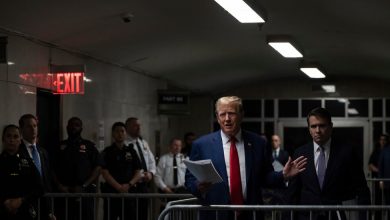Biden Says U.S. Is Considering Dropping Its Case Against Assange

President Biden said on Wednesday that the United States was considering dropping its prosecution of Julian Assange, the WikiLeaks founder who has been jailed in London for years while fighting extradition to face U.S. charges related to his publication of classified documents.
Mr. Biden made the comment on the case of the embattled publisher, who is being detained in a high-security prison, in response to a question about a request from Mr. Assange’s home country of Australia that he be allowed to return there.
“We’re considering it,” Mr. Biden said at the White House, where he was hosting Prime Minister Fumio Kishida of Japan.
Mr. Assange has been jailed for nearly five years after being indicted by the United States with 18 counts of violating the Espionage Act for publishing thousands of documents detailing secret military operations and diplomatic intelligence, as well as revelations about the civilian death tolls in the U.S. wars in Iraq and Afghanistan.
His case has sustained international attention and condemnation from First Amendment rights groups.
Mr. Assange has fought off U.S. efforts to extradite him. The charges could amount to a sentence of up to 175 years in prison, although U.S. lawyers have said that he was more likely to be sentenced to four to six years.
In February, Australia’s parliament passed a motion calling for Mr. Assange’s release, and Prime Minister Anthony Albanese said he had discussed the matter in a meeting last fall with Mr. Biden.
In backing the motion, Mr. Albanese told the Australian parliament “it is appropriate for us to put our very strong view that those countries need to take into account the need for this to be concluded.”
Last month, the High Court in London ruled that Mr. Assange could not be immediately extradited to the United States until certain conditions were met.
The court gave the United States three weeks “to give satisfactory assurances” that Mr. Assange “is permitted to rely on the First Amendment to the United States Constitution (which protects free speech), that he is not prejudiced at trial (including sentence) by reason of his nationality, that he is afforded the same First Amendment protections as a United States citizen and that the death penalty is not imposed.”




